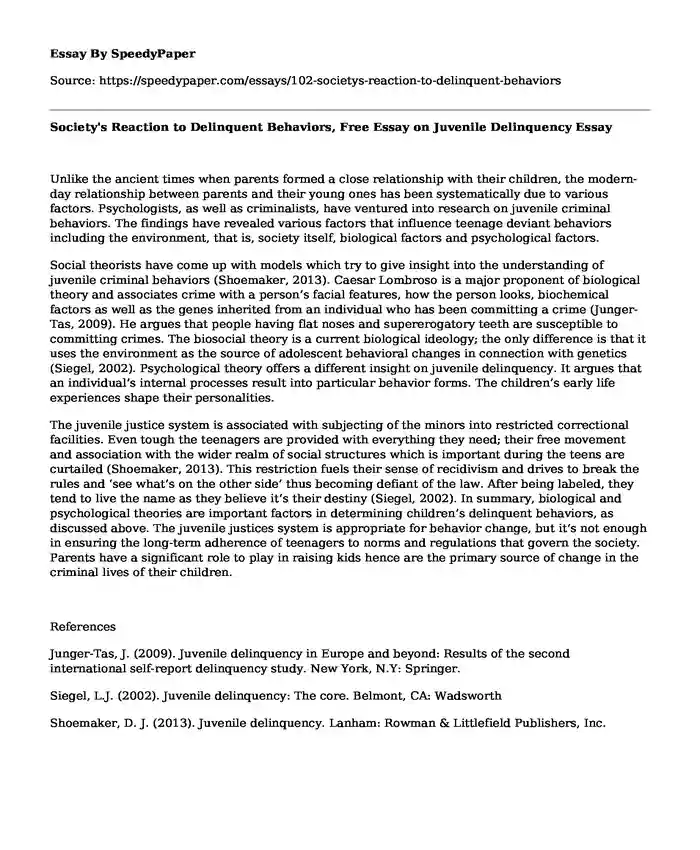
| Type of paper: | Essay |
| Categories: | Parenting Society Criminal justice |
| Pages: | 2 |
| Wordcount: | 417 words |
Unlike the ancient times when parents formed a close relationship with their children, the modern-day relationship between parents and their young ones has been systematically due to various factors. Psychologists, as well as criminalists, have ventured into research on juvenile criminal behaviors. The findings have revealed various factors that influence teenage deviant behaviors including the environment, that is, society itself, biological factors and psychological factors.
Social theorists have come up with models which try to give insight into the understanding of juvenile criminal behaviors (Shoemaker, 2013). Caesar Lombroso is a major proponent of biological theory and associates crime with a person’s facial features, how the person looks, biochemical factors as well as the genes inherited from an individual who has been committing a crime (Junger-Tas, 2009). He argues that people having flat noses and supererogatory teeth are susceptible to committing crimes. The biosocial theory is a current biological ideology; the only difference is that it uses the environment as the source of adolescent behavioral changes in connection with genetics (Siegel, 2002). Psychological theory offers a different insight on juvenile delinquency. It argues that an individual’s internal processes result into particular behavior forms. The children’s early life experiences shape their personalities.
The juvenile justice system is associated with subjecting of the minors into restricted correctional facilities. Even tough the teenagers are provided with everything they need; their free movement and association with the wider realm of social structures which is important during the teens are curtailed (Shoemaker, 2013). This restriction fuels their sense of recidivism and drives to break the rules and ‘see what’s on the other side’ thus becoming defiant of the law. After being labeled, they tend to live the name as they believe it’s their destiny (Siegel, 2002). In summary, biological and psychological theories are important factors in determining children’s delinquent behaviors, as discussed above. The juvenile justices system is appropriate for behavior change, but it’s not enough in ensuring the long-term adherence of teenagers to norms and regulations that govern the society. Parents have a significant role to play in raising kids hence are the primary source of change in the criminal lives of their children.
References
Junger-Tas, J. (2009). Juvenile delinquency in Europe and beyond: Results of the second international self-report delinquency study. New York, N.Y: Springer.
Siegel, L.J. (2002). Juvenile delinquency: The core. Belmont, CA: Wadsworth
Shoemaker, D. J. (2013). Juvenile delinquency. Lanham: Rowman & Littlefield Publishers, Inc.
Cite this page
Society's Reaction to Delinquent Behaviors, Free Essay on Juvenile Delinquency. (2018, Feb 16). Retrieved from https://speedypaper.net/essays/102-societys-reaction-to-delinquent-behaviors
Request Removal
If you are the original author of this essay and no longer wish to have it published on the SpeedyPaper website, please click below to request its removal:
- Free Essay Sample about a Writer's Muse
- Education Essay Sample: ESL Classroom Observation
- Fear and Human Behavior - The Modern Day Witch Hunt
- Literary Essay Sample: The Gothic and Its Influence in Three Works in the Textbook
- Paper Example. The "Thunder Run" Review
- Dialogical logic
- Free Paper Example: Arab Spring Movement
Popular categories




